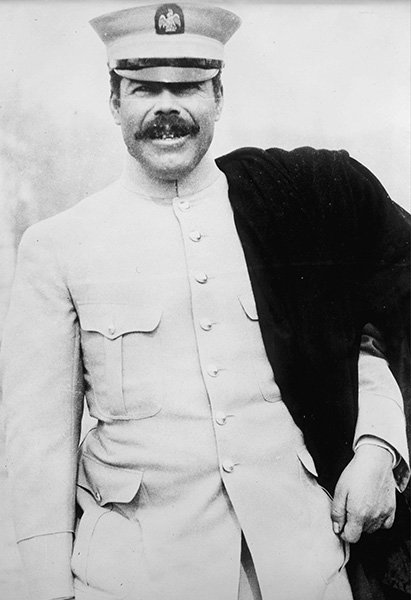Mexico vs. the United States
(GREGORY HOOD) The arc of the moral universe is long, but it bends towards — colonialism. We often hear that problems of immigration, drug-smuggling, and terrorism can’t be solved unless we can tackle the “root causes” in non-white nations. That assumes they can’t solve those causes themselves. Foreign aid has largely failed. Don’t “root cause” solutions imply colonialism?
Mexico will always be a vital interest to the United States. Any attempt to control immigration from Latin America, including Mexico itself, requires Mexican cooperation. American power is built on dominion over North America ever since the Treaty of Guadalupe Hidalgo. Mexican nationalists sometimes muse about reversing the judgment of history through mass immigration or Reconquista.
Mexican criminals have preyed on Americans for a long time. In 1916, Pancho Villa murdered 18 Americans in Chihuahua. General “Black Jack” Pershing led a force 350 miles into Mexico in retaliation just before World War I, but never found Villa — who is celebrated by Mexican-American soccer fans today.
Therefore, it’s not new when Senator Lindsey Graham (R-SC) thunders about wanting to “unleash the fury and might of the U.S.” against groups in Mexico, this time drug cartels. The catalyst was the kidnapping of four American citizens, two of whom were killed. Cartel gunmen evidently mistook them for Haitian drug smugglers. The Gulf Cartel and the “Scorpion Group” have already apologized and even turned in the killers, stressing that they “at all times acted under their own determination and indiscipline and against the rules in which the [Gulf Cartel] always operates.” The Americans were black. That may explain why American outrage was so much stronger than when 70 Mormon missionaries were held hostage in 2021, albeit with none killed.
The incident comes as major media are turning against Mexican president Andres Manuel Lopez Obrador. Former president Donald Trump has praised President Obrador (often called AMLO) but that does not fully explain the opposition. President Obrador has been an opponent of NATO’s policy in Ukraine, which he called “immoral.” That won’t win support from Senator Graham, who now has many voices on his side.
“The Autocrat Next Door,” by David Frum, The Atlantic, February 21, 2023
“Mexico’s populist demagogue president is gutting fair elections,” by Fareed Zakaria, The Washington Post, March 10, 2023
“Mexico’s leader does not belong at democracy summit — and Biden shouldn’t invite him,” by Andres Oppenheimer, Miami Herald, February 24, 2023
Vox, perhaps the most representative outlet of left-liberal opinion, said that Mexico is suffering from an “eroding democracy.” President Obrador wants to cut funding to the National Electoral Institute (INE), the body that regulates Mexico’s elections. Some believe this could undermine “civil society groups,” or NGOs — the Potomac Regime’s preferred tool for meddling in foreign countries. Vox implicitly compared President Obrador’s views on elections to Donald Trump’s because AMLO continues to say the 2006 election was stolen from him.
Vox could almost be writing about Donald Trump:
But that populist, revolutionary framework has clashed with Mexico’s institutions, press, opposition parties, and foreign obligations, like the free trade agreements Mexico signed with the United States and Canada. In the face of his fourth transformation, democratic norms have tended to get in the way, and AMLO has spent countless hours attacking journalists and columnists, non-governmental organizations, civil rights groups, and independent agencies . . . .
Mexican election reform doesn’t seem like a core American interest, but American politicians are unified on the issue. Senate Foreign Relations Committee Chairman Bob Menendez (D-NJ) and House Foreign Affairs Committee Chairman Michael McCaul (R-TX) both attacked AMLO’s proposed reform:
By approving President López Obrador’s proposal to slash the National Electoral Institute’s funding and oversight capabilities, the Mexican Congress has imperiled the future of its country’s democratic institutions.
Several Republicans are urging military action within Mexico in response to drug cartels. Most of those taking the lead on this issue are notably weak on border security. Senator Lindsey Graham is notorious for his repeated support for various amnesty schemes for illegal immigrants.
In January 2023, Rep. Dan Crenshaw (R-TX) went a step further. He introduced an “Authorization for Use of Military Force (AUMF)” in Mexico to stop drug cartels that bring fentanyl into the United States. “My legislation will put us at war with the cartels by authorizing the use of military force against the cartels.” This is the same congressman who helped the lead the charge to denounce Rep. Steve King and who feuded with America First college students in 2019. Now he wants military action in Mexico.
Senator John Cornyn (R-TX) is also talking tough, despite a flaccid record. Last year he was trying to push through an amnesty deal with Democrats. His bill to make “Juneteenth” a holiday is probably the most consequential thing he ever did. Now he’s telling the Biden Administration it “has an open-borders policy in essence, welcoming people from all around the world into the United States only to be released and never heard from again, successfully making it here without any consequences.” He rails against an “open-borders policy that continues to enrich the cartels.” Tough talk from a man who has never done much to secure the border.
Still, the senator is right about the money. According to the New York Times, cartels make an estimated $13 billion a year from migrant smuggling, up from just $500 million in 2018. And this is pocket change compared to drug money.
Amazingly, Speaker of the House Kevin McCarthy (R-CA) is also suddenly militant on border security. “You cannot tell us this border is secure when now there’s enough fentanyl in this country to kill every single American more than 20 times over,” he said. “This has all got to change.” Speaker McCarthy has a weak record on immigration, and says the Republicans are not the party of “nativist dog whistles.” Is he going to stop illegals? No.
Mr. McCarthy and other Republicans have no moral conviction on immigration control, which is about about exclusion. It says certain people are allowed in and others aren’t; it puts citizens above noncitizens. Even though modern-day America is anti-white, this country was founded by de facto white nationalists and what greatness it may still have is mostly what racially consciousness whites handed down to us.
Non-whites understand this. That’s why they hate the American past and work to abolish any legal residue that persists, such as restrictive immigration laws. They rightly suspect that images and heroes of the old America are implicitly “racist.” Republicans, especially when they are committed to cheap labor, find it hard to defend the American past except through the historical fantasy of claiming the Founders’ real goal was post-racial equality.
Oddly, calling for military intervention in foreign countries is more politically correct than refusing to let foreigners in. War as a crusade is now an American tradition. We kill people to save democracy; end war; or to stop fascism, Communism, authoritarianism, or the latest incarnation of Hitler. We do not fight wars in the national interest. That would require a distinction between “us” and “them,” which is now forbidden.
This militarism is cowardice. Cartels are powerful because the United States does not have the will to defend its border or stop drug dealers in the United states. Even if you think the drug war is unwinnable, the government has more power to stop drug-taking within its borders than to stop drug production in a foreign land. Fentanyl is notoriously easy to produce.
The United States of America — it’s a superpower, we are told — lacks the will to defend its border, which makes it weaker than even the smallest sovereign state. President Obrador knows this; he laughed at Republican threats and issued his own:
Starting today we are going to start an information campaign for Mexicans who live and work in the United States and for all Hispanics to inform them of what we are doing in Mexico and how this initiative by the Republicans, in addition to being irresponsible, is an offense against the people of Mexico, a lack of respect for our independence, our sovereignty.
And if they do not change their attitude and think that they are going to use Mexico for their propaganda, electoral, and political purposes, we are going to call for them not to vote for that party, because it is interventionist, inhumane, hypocritical, and corrupt.
Since 2016, American media have been hysterical about so-called Russian meddling and disinformation. Here we have an open threat from a head of state. President Obrador also takes for granted that Mexicans and Hispanics will pay more attention to Mexico and be more eager to defend Mexico’s independence than America’s. There is no outrage. America, having imported a foreign helot population, does not have the power to prevent this. To denounce it is to admit that the United States has been wrong since 1965, when it dismantled the policy to keep America overwhelmingly white.
The more Hispanics we have, the harder it gets to defend the border, fight gangs, or stop drug smuggling. The Border Patrol is mostly Hispanic and there are many cases of corrupt Hispanic officers, some of whom help the coyotes.
Dual loyalty? State-media outlet NPR gave glowing treatment to The Line Becomes A River, a story about a Hispanic in the Border Patrol.
The Guardian wrote:
A third-generation Mexican-American, Cantú joined the US border patrol in 2008, aged 23. Having grown up in Arizona and studied international relations in Washington, he wanted to see the application of theory at ground level: “I’m tired of reading about the border in books,” he tells his mother. The daughter of a Mexican immigrant herself, she is his intermittent confidante and the book’s moral lodestar, troubled by the perils of her son’s job and by his involvement in what she sees as a racist institution. But he assures her that “stepping into a system doesn’t mean that the system becomes you.” The years that follow test that assertion.
A “third-generation Mexican-American” is still torn about his loyalties.
The reason the United States cannot stop fentanyl or migrants coming through Mexico is because it is no longer a real nation. A real nation is a people with common kinship, heritage, and heroes.
America is simply a battleground for real nations to fight over whatever scraps can be torn from the carcass of the nation that died. Republican chest-thumping about military action conceals this weakness. Mexico may be a failed state, but in a century it will still have its present form, culture, and identity. Who can confidently make that claim about the United States?









